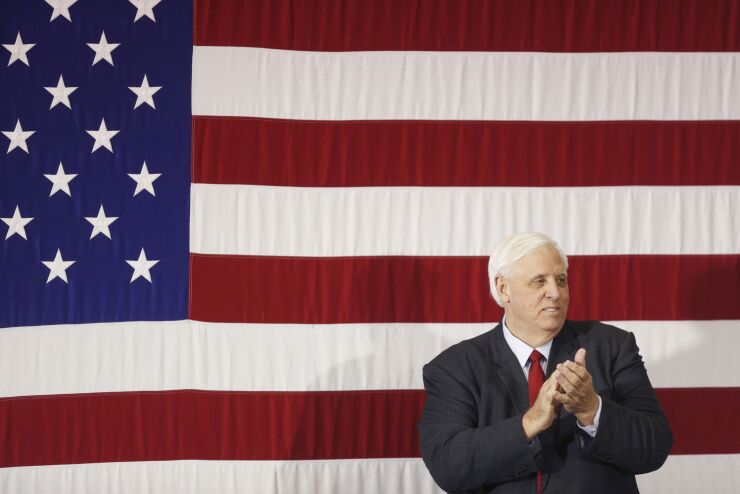
Carter Bankshares' long-running feud with West Virginia Gov. Jim Justice, whose family-owned companies are its biggest borrower, continues to deepen.
The $4.3 billion-asset Carter Bankshares, parent to the 49-year-old Carter Bank & Trust, filed notice earlier this month to auction the Greenbrier Sporting Club, a Justice-owned property in White Sulphur Springs, West Virginia, to satisfy part of the Justice Companies' $302 million debt.
Carter Bankshares in Martinsville, Virginia, filed the auction notice in the Charleston Gazette-Mail on Feb. 5. The move followed a decision by Judge Carter Greer, chief judge of the Martinsville Circuit Court, that denied the Justices'
Confessions of judgment are provisions included in loan agreements that permit creditors to obtain a judgment against a debtor without a trial. Though their legality has been upheld by the U.S. Supreme Court, some consider confessions of judgment controversial since they seemingly require borrowers to waive due process rights.
Carter Bankshares has since agreed to postpone the auction, scheduled for Tuesday at the Greenbrier County Courthouse, after the Greenbrier Sporting Club filed a legal challenge.
Multiplying lawsuits
Litigation involving Greenbrier Sporting Club is the latest addition to a growing pile of court actions spawned by the Justice-Carter Bankshares feud. Earlier this month, the United Kingdom-based GLAS Trust, filed suit against Carter Bank & Trust in the U.S. District Court in Charlottesville, Virginia.
According to the lawsuit GLAS filed Feb. 12, Carter Bankshares forced the Justice Companies to use funding that a GLAS client — a nonbank entity in the U.K. — lent to Bluestone Resources "to repay hundreds of millions of dollars of Carter Bank debt on which the Bluestone entities themselves were not obligated." Bluestone is a network of Justice-owned coal companies that operate separately from those involved with Carter Bankshares. Overall, Justice and his family operate more than 100 companies.
"The Bluestone entities received nothing of value in exchange for any of these transfers," the GLAS suit added.
Carter Bankshares hit back in a Feb. 15 press release, stating "the company and Carter Bank strongly believe that the factual allegations in the lawsuit regarding transactions involving Carter Bank are false and misleading."
According to Carter Bankshares, "Carter Bank received those funds as part of routine refinance and payment transactions in good faith and in the ordinary course, as repayment of amounts owed to Carter Bank." A pre-existing indemnification agreement obligates the Justice Companies to pay any judgment resulting from the GLAS suit, Carter Bankshares added.
A Carter Bankshares spokesman had not responded to a request for additional comment at deadline.
The GLAS suit follows on the heels of a
Settlement possibilities
Analyst Feddie Strickland, who covers Carter Bankshares for Janney Montgomery Scott, gave the company a "buy" rating in a Feb. 16 research note. Strickland described the prospect of a GLAS legal win as "remote." Strickland added that he continued "to feel that [Carter Bankshares] shareholders will be made whole with respect to the Justice relationship."
In a late January research note, Strickland suggested a likely outcome of the feud was a refinancing arrangement with a third-party lender, possibly a hospitality-related private equity firm, that allowed the Justices to pay off its Carter Bankshares debt. Even after the auction notice and GLAS lawsuit, "I still think [refinancing] is a possibility," Strickland said Wednesday in an interview. Strickland, however, added that Carter Bankshares "believes it is in a really good legal position with a lot of collateral to make shareholders whole," if a collection process is necessary.
"The difference between finding another lender versus going through the collection process is simply a question of timing," Strickland wrote in his January note.
The Justices' relationship with Carter Bankshares dates back to the early 2000s, when the company was run by its founder, the late Worth Harris Carter. Over the years, it grew, eclipsing $700 million in 2017, the year Carter passed. In a sign of how close the relationship was, Justice delivered a eulogy at Carter's funeral.
Things began to sour as Carter Bankshares, now under the leadership of Carter's successor, CEO Litz Van Dyke, sought to downsize its involvement with the Justice Companies. In 2021, the Justices filed a suit claiming Carter Bank "induced a default," triggering the accelerated maturities in hundreds of millions of dollars in debt. Though the sides came to an agreement later that year, the settlement had unraveled by the spring of 2023.
Whatever good feeling Gov. Justice once had for Carter Bankshares has clearly faded, as a result of the rift. "Carter Bank has been terrible," Justice said during a Feb. 7 press briefing. "Beyond terrible. More than your wildest dreams."
Justice called his company's legal challenge to Carter "valid and justified" and promised a strong response to the attempt to auction Greenbrier Sporting Club.
"We're not going to put up with it anymore," Justice said at the press briefing. "We're going to push back like you can't imagine."
In a Jan. 30 investor presentation, Carter Bankshares noted the remaining $302 million of loans to Justice make up about 98% of its nonperforming loans. A settlement, via either refinancing or a collection process would be "transformative" Strickland said.
"It's a real clean bank without this legacy relationship," Strickland said.





